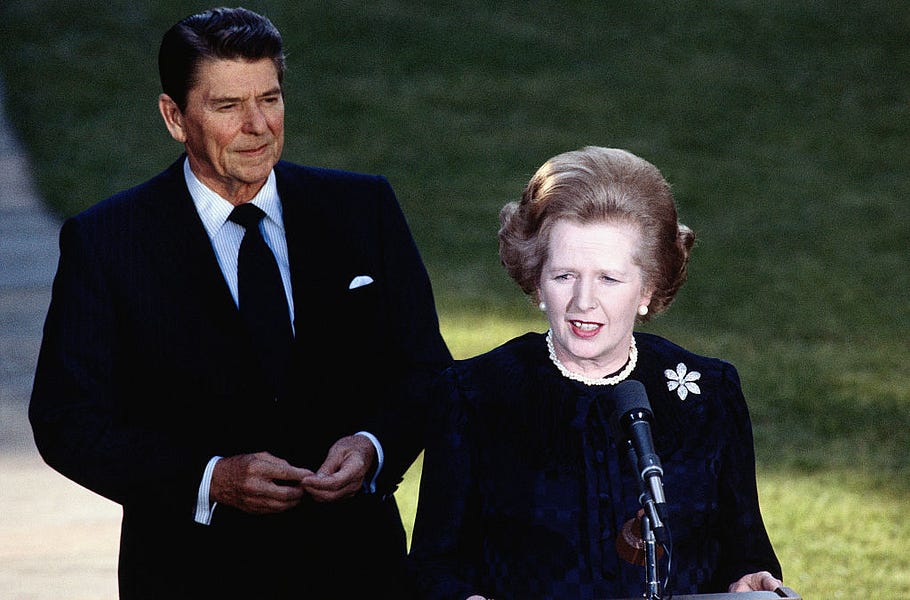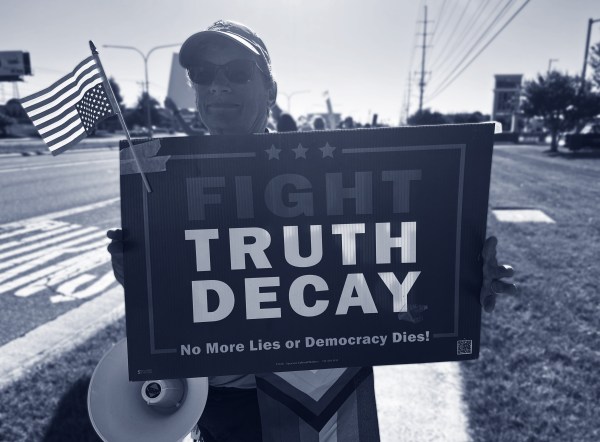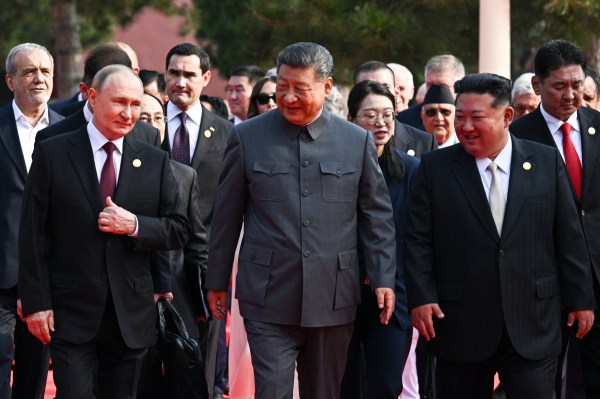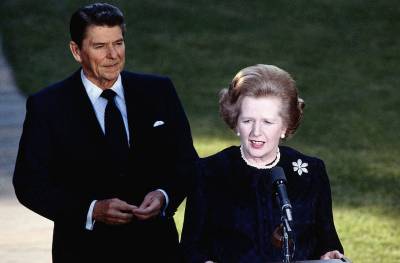I started my Monday by reading this excellent piece by my friend and former National Review colleague Jay Nordlinger. The purpose was to celebrate Ronald Reagan’s birthday and to defend the continued relevance of both his politics and his character. There is a tendency on the new right to sneer at any hint of continued Reaganism in American conservatism. “Times have changed,” they say. Reagan is no longer relevant.
They have a limited point, one that’s rooted in basic common sense. Of course times change. Of course our economic and geopolitical challenges evolve. So does our culture. Let’s just take one example—the almost unthinkably high stake of the Cold War. To give younger readers an idea of what these days were like, I pulled up NATO’s analysis of the balance of forces in Europe in 1984.
As we rightly worry about roughly 150,000 Russian troops massed on Ukraine’s borders, consider that at the height of the Cold War, the Warsaw Pact massed up to 4 million troops in Europe. They were forward-deployed for offensive operations. This massive force included a staggering 61,000 main battle tanks and more than 13,000 aircraft. In total, the Soviets and their allies commanded 246 divisions, a force every bit as vast as the great armies of World War II.
NATO opposed this force with 2.6 million troops arrayed in defensive positions, with 2 million more stationed in the U.S. and other NATO nations outside Europe. This force of 82 divisions and 180 independent brigades included 25,000 main battle tanks and more than 11,000 aircraft. Collectively, the two forces represented the most destructive and powerful military force the world had ever seen, and they stared at each other, on varying levels of alert, for almost 50 years.
And I haven’t even mentioned the thousands of nuclear missiles primed to launch on warning of an attack, before even the first warhead fell.
We’re not in that place now (thank God), even with escalating great power tensions. But when we look at the array of issues confronting America, I’m starting to experience more than a little déjà vu. I’m hearing echoes of the old issues, from the Before Times, when we weren’t the world’s hyperpower and our destiny was in doubt.
On a surface level you can check off a number of old issues that are new again. Crime is rising. There’s a drug crisis in our streets. It’s not crack, but opioids that are killing Americans by the tens of thousands. We’re talking about inflation for the first time in years. And while we don’t yet have a new Cold War, America’s adversaries are closing a once-immense military power gap, and they’re increasingly aggressive.
Meanwhile, we’re in retreat and reeling from the sudden fall of an allied capital. I never thought we’d see images that rivaled the panic evident in Saigon in 1975, but Kabul in 2021 shocked the world.
As important as those issues are, there’s something even deeper and more profound at stake in our politics, where each of the issues above are both symptomatic of and contribute to an underlying disease. And that’s where the ’80s feel most relevant and Reagan’s political revolution—and personal character—is most salient.
If it’s easy to forget the issues of the ’80s, it’s also easy to forget the spirit of the age at the onset of the decade. On July 15, 1979, Jimmy Carter addressed it directly, delivering a speech called “Crisis of Confidence.” It went down in history (somewhat unfairly) as the “malaise speech.” He never used that word. But here’s what he did say, and while his words weren’t necessarily inspiring, they did ring true:
After listening to the American people I have been reminded again that all the legislation in the world can’t fix what’s wrong with America. So, I want to speak to you first tonight about a subject even more serious than energy or inflation. I want to talk to you right now about a fundamental threat to American democracy.
I do not mean our political and civil liberties. They will endure. And I do not refer to the outward strength of America, a nation that is at peace tonight everywhere in the world, with unmatched economic power and military might.
The threat is nearly invisible in ordinary ways. It is a crisis of confidence. It is a crisis that strikes at the very heart and soul and spirit of our national will. We can see this crisis in the growing doubt about the meaning of our own lives and in the loss of a unity of purpose for our nation.
The erosion of our confidence in the future is threatening to destroy the social and the political fabric of America.
That’s it. Those paragraphs right there are why the ’80s are calling. In many ways the America of 2022 is in an almost incalculably stronger place than the America of 1979. Its people are more prosperous. The nation is more powerful. But a mob stormed the Capitol. Mobs burned businesses in cities from coast to coast. Trust in American institutions is in a state of collapse. Talk of civil war is in the air.
The “loss of a unity of purpose” is very real. A “crisis of confidence” exists. It’s our principal national problem.
On the 40th anniversary of Reagan’s first inaugural, the Ronald Reagan Institute commissioned me to write an essay on the meaning of his address and of his legacy. His thesis was simple—in reflecting back on a decade of division, retreat, and defeat, the American people hadn’t failed, they’d been failed. When Reagan said, “In this present crisis, government is not the solution to our problem; government is the problem” this wasn’t libertarian or small-government boilerplate, it was a statement of fact. American governmental institutions had failed.
They had faced extraordinary challenges, to be sure, but the results spoke for themselves, and for a nation that could still immediately remember victory in World War II and a United States as a mighty force for good in the world, it was a deeply disorienting experience.
Nixon confronted a dividing nation and tried to unite it (and briefly did, with a 49-state landslide in 1972), but his cruelty and corruption destroyed his presidency and his legacy. Carter, a humble and decent man, turned the page on Nixon’s corruption, but despite some enduring successes (the Camp David Accords remain a remarkable achievement), the job was too big for him, the challenges too great.
So what is it, specifically, about the Reagan legacy that should appeal so strongly now? There are resonant policy elements, including confidence in American strength and commitment to American alliances and—as Jay notes in his essay—a welcoming spirit for legal immigrants and a proper understanding that their desire to leave their homes and travel to this country represents a validation of American liberty and American opportunity.
But what’s even more resonant is the spirit of the man and movement. No one should think Reagan was perfect. Of course not. But there is a reason why, as Jay notes, Peggy Noonan titled her memoir of that American moment When Character was King.
One of the great blessings of American history is that time and again—during moments of doubt and despair—its key leaders stepped forward with determined hearts, yes, but also with a commitment to elevate the American spirit. Think of Washington, Lincoln, Roosevelt, and Reagan. These individuals, flawed as they were, ultimately connected with and defined the best of American culture.
Why is Woodrow Wilson not in that list? Because his response to crisis is increasingly and rightly remembered as a time of repression and retrenchment. He won his war, yes, but there is a reason why Americans longed for “normalcy” after his presidency.
America will not recover from its present crisis of confidence through corruption and authoritarianism. It’s hard to imagine the consequences of another Trump presidency. To put the present GOP in context, what if the dominant percentage of the party was convinced that the answer to Carter was more Nixon? And that Reagan was a traitor if he dared challenge his corrupt predecessor?
Nor will America recover if the Biden presidency continues its present track. It’s not just defeat in Afghanistan that dealt him a profound blow, it was the sheer callousness of the retreat and the incompetence of the evacuation. We broke faith. We abandoned the innocent. We emboldened our enemies. Biden has his accomplishments, but the old maladies of crime, inflation, and great power rivalry loom large once again. Confidence continues to collapse.
I’ll end with this: Ultimately the American people get the leaders they want. Yes, we can be fooled for a time. We can believe a man is competent when he’s not. We can believe a leader is honorable when she’s corrupt. But, ultimately, if the American spirit grows too dark then that darkness will be reflected in its politics.
Our record isn’t one of unbroken progress. American idealism and courage can be glorious to behold. The American id can be dark and grim. That id has almost destroyed this nation before. It threatens it again. If the ’80s are indeed calling, there are key questions for our country: Is there a politician who possesses character and competence who can answer? And do the American people even want such a person in power? Or is the id spiraling out of control?
One last thing …
Dispatch members, I’m curious. Are you watching the Olympics? I just can’t do it. I tweeted this last night:
It’s past time for this nation to not just wake up to the true nature of the Chinese regime. We’re going to have to relearn how to confront great power tyranny, and that includes by adjusting how we react to Chinese propaganda and what we demand from our own leaders.
China is actively committing genocide. It is actively threatening our allies. I’m deeply uncomfortable with any action that expresses or implies that business as usual is the order of the day.







Please note that we at The Dispatch hold ourselves, our work, and our commenters to a higher standard than other places on the internet. We welcome comments that foster genuine debate or discussion—including comments critical of us or our work—but responses that include ad hominem attacks on fellow Dispatch members or are intended to stoke fear and anger may be moderated.
With your membership, you only have the ability to comment on The Morning Dispatch articles. Consider upgrading to join the conversation everywhere.